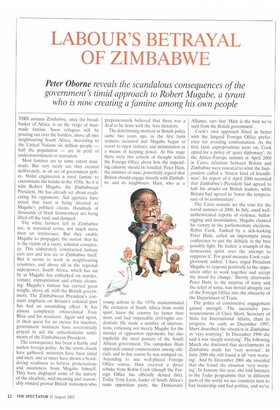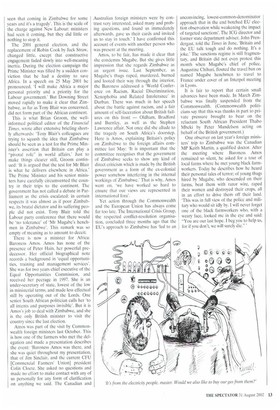LABOUR'S BETRAYAL OF ZIMBABWE
Peter Oborne reveals the scandalous consequences of the
government's timid approach to Robert Mugabe, a tyrant who is now creating a famine among his own people
THIS autumn Zimbabwe, once the breadbasket of Africa, is on the verge of manmade famine. Soon refugees will be pouring out over the borders, above all into neighbouring South Africa. According to the United Nations six million people — half the population — are in peril of undernourishment or starvation.
Most famines are to some extent manmade. But very rarely are they created deliberately, as an act of government policy. Stalin engineered a rural famine to exterminate the kulaks in the 1930s. So it is with Robert Mugabe. the Zimbabwean President. He has already set about eradicating his opponents. Aid agencies have noted that food is being diverted to Mugabe's political clients. Hundreds of thousands of black farmworkers are being lifted off the land, and dumped.
The white farmers left in Zimbabwe are, in statistical terms, not much more than an irrelevance. But they enable Mugabe to propagate the notion that he is the victim of a racist, colonial conspiracy. This elaborately constructed fantasy cuts less and less ice in Zimbabwe itself. But it seems to work in neighbouring countries, and above all in the regional superpower, South Africa, which has sat by as Mugabe has embarked on murder, torture, expropriation and ethnic cleansing. Mugabe's fantasy has carried great weight, above all, with the British government. The Zimbabwean President's constant emphasis on Britain's colonial past has had an astonishing effect. It has almost completely emasculated Tony Blair and his ministers. Again and again, in their quest for an excuse for inaction, government ministers have reverentially prayed in aid the anticolonialist sentiments of the Zimbabwean President.
The consequence has been a feeble and useless foreign policy. As the storm clouds have gathered, ministers have been timid and inert, and at times have shown a bewildering readiness to believe protestations and assurances from Mugabe himself. They have displayed some of the naivety of the idealistic, well-meaning and reasonably minded prewar British statesmen who preposterously believed that there was a deal to be done with the Axis dictators.
The determining moment in British policy came two years ago, as the first farm seizures occurred and Mugabe began to resort to open violence and intimidation as a means of keeping power. At this stage there were two schools of thought within the Foreign Office about how the impending calamity should be handled. Peter Hain, the minister of state, powerfully argued that Britain should engage directly with Zimbabwe and its neighbours. Hain, who as a young activist in the 1970s masterminded the exclusion of South Africa from world sport, knew the country far better than most, and had impeccable civil-rights credentials. He made a number of interventions, criticising not merely Mugabe for the murder of opposition opponents, but also implicitly the inert posture of the South African government. The outspoken Hain approach caused consternation among officials, and in due course he was stamped on. According to one well-placed Foreign Office source, Hain received a direct rebuke from Robin Cook (though the Foreign Office has officially denied this). Today Tony Leon, leader of South Africa's main opposition party, the Democratic Alliance, says that 'Hain is the best we've seen from the British government'.
Cook's own approach fitted in better with the languid Foreign Office preference for avoiding confrontation. As the first farm expropriations went on, Cook opted for a policy of 'quiet diplomacy'. At the Africa–Europe summit in April 2000 in Cairo, relations between Britain and Zimbabwe were restored to what the Independent called a 'frozen kind of friendliness'. Its report of 6 April 2000 recorded that Zimbabwe's President had agreed to halt his attacks on British leaders, while Britain had agreed to 'lower the temperature of its commentary'.
The Cairo summit set the tone for the torrid summer of 2000. In July, amid wellauthenticated reports of violence, ballotrigging and intimidation, Mugabe claimed his victory in the parliamentary elections. Robin Cook, flanked by a sick-looking Peter Hain, called an impromptu press conference to put the debacle in the best possible light. He hailed 'a triumph of the democratic spirit over the attempt to suppress it'. For good measure Cook vaingloriously added, 'I have urged President Mugabe to respond positively to the opposition offer to work together and accept the mood for change.' Shortly afterwards Peter Hain, to the surprise of many and the relief of some, was moved abruptly out of the Foreign Office into the obscurity of the Department of Trade.
The policy of constructive engagement gained strength. The successive pronouncements of Clare Short, Secretary of State for International Affairs, chart its progress. As early as December 1997, Short described the situation in Zimbabwe as 'very worrying'. In December 1998 she said it was 'deeply worrying'. The following March she disclosed that developments in Zimbabwe made her 'very worried'. In June 2000 she still found it all 'very worrying'. And by December 2001 she revealed that she found the situation 'very worrying'. In January this year, she told listeners to the Today programme that 'in different parts of the world we see countries turn to bad leadership and bad politics, and we've
seen that coming in Zimbabwe for some years and it's a tragedy'. This is the scale of the charge against New Labour: ministers had seen it coming, but they did little or nothing to stop it.
The 2001 general election, and the replacement of Robin Cook by Jack Straw, changed little, except that constructive engagement faded slowly into well-meaning inertia. During the election campaign the Prime Minister was filled by a sudden conviction that he had a destiny to save Africa. In a speech on 25 May 2001 he pronounced, 'I will make Africa a major personal priority and a priority for the Labour government.' But Downing Street moved rapidly to make it clear that Zimbabwe, as far as Tony Blair was concerned, did not form part of the African continent.
This is what Brian Groom, the wellinformed political editor of the Financial Times. wrote after extensive briefing shortly afterwards: 'Tony Blair's colleagues are trying to squash the idea that Zimbabwe should be seen as a test for the Prime Minister's assertion that Britain can play a "pivotal role" in world affairs.' Just to make things clearer still, Groom continued: 'It is argued that the test for Mr Blair is what he delivers elsewhere in Africa.' The Prime Minister and his senior ministers have carefully circumvented the country in their trips to the continent. The government has not called a debate in Parliament as the crisis escalated: in certain respects it was almost as if poor Zimbabwe, its brutal dictator and its suffering people did not exist. Tony Blair told the Labour party conference that there would be 'no tolerance' of `Mr Mugabe's henchmen in Zimbabwe'. This remark was so empty of meaning as to amount to deceit.
There is now a minister for Africa: Baroness Amos. Amos has none of the presence of Peter Hain, her powerful predecessor. Her official biographical note records a background in 'equal opportunities, training and management services'. She was for two years chief executive of the Equal Opportunities Commission, and received her peerage in 1997. She is an under-secretary of state, lowest of the low in ministerial terms, and made less effectual still by operating out of the Lords. One senior South African politician calls her `to all intents and purposes invisible'. But it is Amos's job to deal with Zimbabwe, and she is the only British minister to visit the country since the last election.
Amos was part of the visit by Commonwealth foreign ministers last October. This is how one of the farmers who met the delegation and made a presentation describes the event: 'Baroness Amos was there, and she was quiet throughout my presentation, that of Jim Sinclair, and the current CFU [Commercial Farmers' Union] president Colin Cloete. She asked no questions and made no effort to make contact with any of us personally for any form of clarification on anything we said. The Canadian and Australian foreign ministers were by contrast very interested, asked many and probing questions, and found us immediately afterwards, gave us their cards and invited us to stay in touch.' I have confirmed this account of events with another person who was present at the meeting.
Amos, to be fair, has made it clear that she condemns Mugabe. But she gives little impression that she regards Zimbabwe as an urgent issue. Last September. as Mugabe's thugs raped, murdered, burned and looted their way through the interior, the Baroness addressed a 'World Conference on Racism, Racial Discrimination, Xenophobia and Related Intolerance' in Durban. There was much in her speech about the battle against racism, and a fair amount of self-laceration about British failures on this front — Oldham, Bradford and Burnley, as well as the Stephen Lawrence affair. Not once did she allude to the tragedy on South Africa's doorstep. Here is Amos, explaining Britain's policy on Zimbabwe to the foreign affairs committee last May: 'It is important that the committee recognises that the government of Zimbabwe seeks to show any kind of direct criticism which is made by the British government as a form of the ex-colonial power somehow interfering in the internal workings of Zimbabwe.' That is why, Amos went on. 'we have worked so hard to ensure that our views are represented in international fora'.
Yet action through the Commonwealth and the European Union has always come far too late. The International Crisis Group, the respected conflict-resolution organisation, concluded three months ago that the EU's approach to Zimbabwe has 'led to an unconvincing, lowest-common-denominator approach that in the end botched EU election observation while weakening the impact of targeted sanctions'. The ICG director and former state department adviser, John Prendergast, told the Times in June, 'Britain and the EU talk tough and do nothing. It's a joke.' The sanctions regime is still fragmentary, and Britain did not even protest this month when Mugabe's chief of police. Augustine Chihuri, flouted the travel ban on named Mugabe henchmen to travel to France under cover of an Interpol meeting in Lyons.
It is fair to report that certain small advances have been made. In March Zimbabwe was finally suspended from the Commonwealth. (Commonwealth politicians say that this was thanks in part to private pressure brought to bear on the reluctant South African President Thabo Mbeki by Peter Mandelson acting on behalf of the British government.)
One observer on last year's foreign ministers' trip to Zimbabwe was the Canadian MP Keith Martin, a qualified doctor. After the meeting where Baroness Amos remained so silent, he asked for a tour of local farms where he met young black farmworkers. Today he describes how he heard their personal tales of terror; of young thugs hired by Mugabe, who descended on their farms, beat them with razor wire, raped their women and destroyed their crops, all in an effort to drive them off their land. 'This was in full view of the police and military who would sit idly by. I will never forget one of the black farmworkers who, with a weary face, looked me in the eye and said: -You are our last hope. I beg you to help us, for if you don't, we will surely die."'



























































 Previous page
Previous page